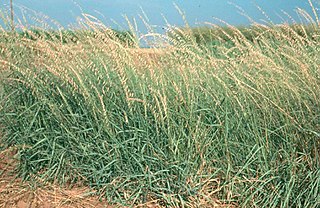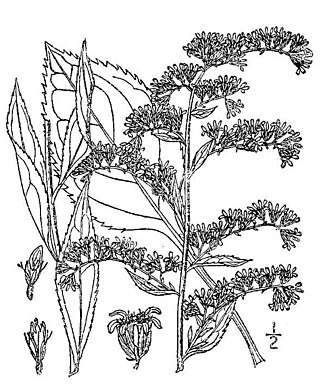
Solidago, commonly called goldenrods, is a genus of about 100 to 120 species of flowering plants in the family Asteraceae. Most are herbaceous perennial species found in open areas such as meadows, prairies, and savannas. They are mostly native to North America, including Mexico; a few species are native to South America and Eurasia. Some American species have also been introduced into Europe and other parts of the world.

Bouteloua is a genus of plants in the grass family. Members of the genus are commonly known as grama grass.

Symphyotrichum pilosum is a perennial, herbaceous, flowering plant in the Asteraceae family native to central and eastern North America. It is commonly called hairy white oldfield aster, frost aster, white heath aster, heath aster, hairy aster, common old field aster, old field aster, or steelweed. It may reach 20 to 120 centimeters tall, and its flowers have white ray florets and yellow disk florets.

Solidago nemoralis is a species of flowering plant in the family Asteraceae. It is native to North America, where it is widely found in Canada and the United States. Its common names include gray goldenrod, gray-stem goldenrod, old-field goldenrod, field goldenrod, prairie goldenrod, dwarf goldenrod, and dyersweed goldenrod.

Solidago rugosa, commonly called the wrinkleleaf goldenrod or rough-stemmed goldenrod, is a species of flowering plant in the family Asteraceae. It is native to North America, where it is widespread across eastern and central Canada and the eastern and central United States. It is usually found in wet to mesic habitats.

Solidago speciosa, the showy goldenrod, is a North American species of flowering plants in the family Asteraceae. It grows in the province of Ontario in central Canada, as well as in the eastern and central United States.

Solidago gigantea is a North American plant species in the family Asteraceae. Its common names include tall goldenrod and giant goldenrod, among others.
Solidago guiradonis is an uncommon species of goldenrod known by the common name Guirado goldenrod. It is native to the Central California Coast Ranges of central California, in southern San Benito and western Fresno Counties.

Solidago multiradiata is a species of goldenrod known by the common names Rocky Mountain goldenrod, northern goldenrod, and alpine goldenrod. It is native to North America, where it can be found throughout the northern regions, including Alaska and most of Canada (all 3 territories plus all provinces except Prince Edward Island, including territory north of the Arctic Circle. Its distribution extends through the western United States as far south as Arizona, New Mexico, and California. It is known mostly from the subalpine and alpine climates of high mountain ranges. Its habitat includes tundra and mountain meadows.

Solidago spectabilis is a species of goldenrod known by the common names Nevada goldenrod, basin goldenrod, and showy goldenrod. It is native to the western United States in the Great Basin and surrounding areas. It is found in California, Arizona, Nevada, Oregon, and Utah. There are historical records saying it once grew in southwestern Idaho, but is now extirpated there. This variety has also been seen in the western Montana county of Sanders.

Solidago spithamaea is a species of flowering plant in the family Asteraceae known by the common name Blue Ridge goldenrod. It is native to a very small region around the border between North Carolina and Tennessee in the United States. Its three remaining populations are threatened by the loss and degradation of its habitat. It is a federally listed threatened species of the United States.

Solidago houghtonii is a rare North American species of flowering plant in the family Asteraceae known as Houghton's goldenrod. It is native to southern Ontario, Canada and the northern United States. It is threatened by the loss and degradation of its habitat. It is a federally listed threatened species of the United States and it is designated a species of special concern by Canada's Committee on the Status of Endangered Wildlife in Canada.

Solidago missouriensis is a species of flowering plant in the family Asteraceae known by the common names Missouri goldenrod and prairie goldenrod. It is native to North America, where it is widespread across much of Canada, the United States, and northern Mexico. It grows from British Columbia east to Manitoba, south as far as Sonora, Coahuila, Texas, and Mississippi.

Solidago ouachitensis is a North American species of flowering plants in the family Asteraceae known by the common name Ouachita Mountain goldenrod. It has a very limited range, found only in the Ouachita Mountains along the border between Arkansas and Oklahoma in the United States.
Solidago verna is a species of flowering plant in the aster family known by the common names springflowering goldenrod and spring goldenrod. It is native to North Carolina and South Carolina in the United States.
Solidago juliae, known as Julia's goldenrod, is a plant native to central and western Texas, as well as southern Arizona, Chihuahua, Coahuila and Nuevo León. It occurs in grasslands, woodlands, and on freshwater shores.

Solidago arguta, commonly called Atlantic goldenrod, cut-leaf goldenrod, and sharp-leaved goldenrod, is a species of flowering plant native to eastern and central North America. It grows along the Gulf and Atlantic states of the United States from Texas to Maine, inland as far as Ontario, Illinois, and Kansas. It is primarily found in areas of woodland openings, such as outcrops or clearings.

Solidago lepida, the western Canada goldenrod or western goldenrod, is a North American plant species in the genus Solidago of the family Asteraceae. It is widespread across much of Canada, the western United States, and northern Mexico.

Solidago rigida, known by the common names stiff goldenrod and stiff-leaved goldenrod, is a North American plant species in the family Asteraceae. It has a widespread distribution in Canada and the United States, where it is found primarily east of the Rocky Mountains. It is typically found in open, dry areas associated with calcareous or sandy soil. Habitats include prairies, savannas, and glades.

Solidago nana is a North American plant species in the family Asteraceae, with the common names baby goldenrod and dwarf goldenrod. The species is native to deserts and mountainsides in the western United States, from the Rocky Mountains to the Great Basin in the states of Idaho, Montana, Nevada, Utah, Wyoming, Colorado, Arizona, and New Mexico.



















